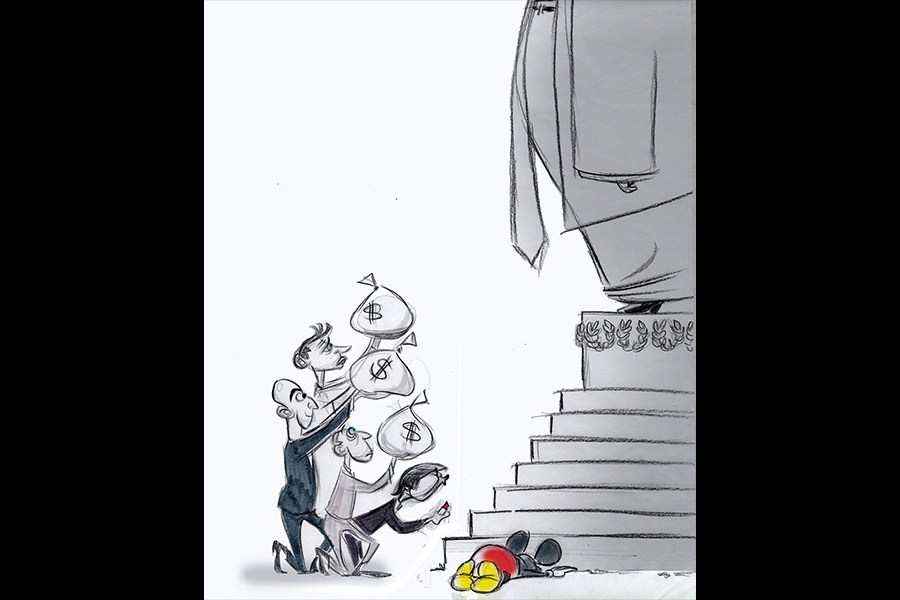Artificial push
Sir — Many of us use timers on apps to limit our screen time. But what really is more binding than our own conviction? Researchers recently have come up with an idea to use technology to reduce a harmful habit: they have invented smartwatches that detect whether a person has been smoking, keeping tabs on the frequency of cigarettes, and encouraging smokers to quit the practice. But will this be enough? Where disturbing images of lung cancer on cigarette packets have been ineffective, can dependence on Artificial Intelligence persuade smokers who have little will to kick their addiction?
Bilal Rastogi, Delhi
Lives ruined
Sir — A staggering 473 million-plus children live in war-ravaged regions, as per a UNICEF report (“Children of war”, Dec 31). Educational institutions have been destroyed, depriving children of a chance to acquire knowledge. Hospitals have been bombarded and destroyed and sick children, who require medical attention, cannot avail of it. The supply of essential items has been stopped. The surviving children shall thus live traumatised lives. War-mongering global leaders are but mindless ghouls. Citizens from nations across the world must come together and protect young people who are suffering due to wars.
Sanjit Ghatak, Calcutta
Sir — Millions of children have become victims of the wars in Gaza and Ukraine, where war crimes against civilians are being committed by the Israeli and the Russian forces, respectively. As the future of children from strife-torn nations becomes distressing, the international community continues to look the other way.
Aranya Sanyal, Siliguri
Debts paid
Sir — The chief minister of West Bengal, Mamata Banerjee has said that Star Theatre has been renamed Binodini Theatre (“Star Theatre named after Nati Binodini”, Dec 31). Banerjee’s decision rectifies a historical injustice done by a misogynistic society that ostracised one of Bengal’s most successful female stage performers, Nati Binodini, as she came from Calcutta’s red-light area. This initiative challenges patriarchal conventions. Calcutta had two Star Theatres. The famous Indian theatre personality, Girish Chandra Ghosh, had persuaded Bindoni Dasi to become the mistress of the businessman, Gurmook Roy, to ensure that he sponsored one of the theatres. Although she consented to the plan, the theatre was not named after her. Four years later, she voluntarily withdrew from the profession. The theatre changed its name several times before being finally demolished in 1931. The existing Star Theatre, which is being renamed, was built in 1888 by Girish Chandra Ghosh and others. Mamata Banerjee’s move will finally pay Bengali theatre’s 141-year-old debt to Binodini.
Khokan Das, Calcutta
Sir — The year came to an end on a joyful note for theatre lovers with the renaming of the historical Star Theatre as Binodini Theatre. This harks back to a time when Hatibagan was the epicentre of amusement and entertainment in Calcutta, before the easy availability of television and movie halls.
While Binodini Dasi had dedicated her life to Bengali theatre, she was not adequately compensated for her efforts. Decades after her death, she is finally being memorialised the way she deserves to be.
Pratima Manimala, Howrah
Sir — The iconic Star Theatre of Calcutta was rechristened after the pioneering female stage performer, Binodini Dasi, popularly known as Nati Binodini. Binodini broke societal norms and emerged as the leading star of contemporary Bengali theatre.
The spiritual guru, Ramakrishna Paramhansa, who had come to watch the piece, Chaitanya Leela, had blessed Binodini for her stellar performance. One hopes that Mamata Banerjee goes the extra mile and erects a statue of Binodini in front of the hall.
Sourish Misra, Calcutta
Sir — Star Theatre has been renamed Binodini Theatre after Binodini Dasi, a leading actress who quit the stage at the height of her career. The Kolkata Municipal Corporation has notified the new name through a circular.
Romana Ahmed, Calcutta
Tight rules
Sir — The Central government’s decision to withdraw the ‘no-detention’ policy from primary and secondary education is a welcome development. Earlier, students would be promoted despite poor academic performance. This, however, adversely affected their learning abilities, as several reports have indicated. The move to scrap the policy will thus improve the quality of education at the school level and inculcate discipline among students who will have to rigorously study to pass the examinations. While the Right to Education Act is a good initiative, not detaining underperforming pupils led to a generation of poorly-educated students.
Navneet Seth, Bathinda, Punjab










